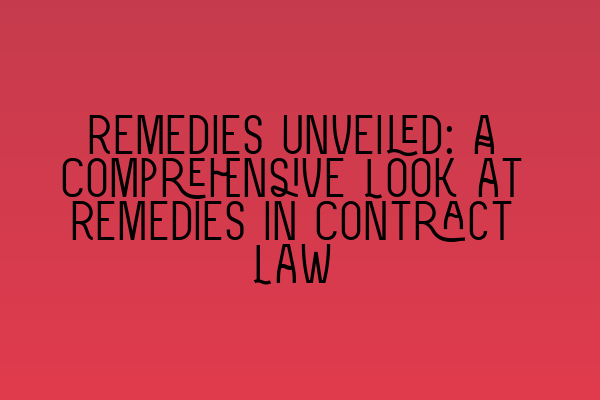Remedies Unveiled: A Comprehensive Look at Remedies in Contract Law
Welcome to SQE Contract Law’s comprehensive guide to remedies in contract law. Contracts form the foundation of many business relationships and transactions, and understanding the available remedies for breach of contract is essential for legal professionals and practitioners.
What Are Remedies?
In contract law, remedies refer to the means by which a party who has suffered a breach of contract can seek compensation or enforce specific performance. Remedies aim to restore the injured party to the position they would have been in had the contract been performed as per its terms.
There are various remedies available in contract law, and their availability depends on the nature and severity of the breach. Let’s explore some common remedies below:
1. Damages
Damages are the most common form of remedy in contract law. They are monetary awards intended to compensate the non-breaching party for any losses suffered as a result of the breach. Damages can be either compensatory or punitive, depending on the circumstances.
Compensatory damages aim to put the non-breaching party in the position they would have been in if the contract had been performed. Punitive damages, on the other hand, are awarded in cases where the breach was willful or malicious, and they aim to punish the breaching party.
To calculate the amount of compensatory damages, various factors are considered, such as lost profits, reliance damages, and consequential damages. Each case is unique, and courts assess the damages based on the specific circumstances involved.
For more information on damages in contract law, check out our article SQE 1 Practice Exam Questions.
2. Specific Performance
Specific performance is a remedy that compels the breaching party to fulfill their contractual obligations as agreed upon. It is typically sought in cases where monetary damages would be inadequate to remedy the suffering party’s loss or where the subject matter of the contract is unique.
This remedy is commonly used for contracts involving real estate, artwork, or rare collectibles. Specific performance is enforced through a court order mandating the breaching party to perform exactly as specified in the contract.
For a deeper dive into specific performance and its application in contract law, read our article SQE 1 Practice Mocks FLK1 FLK2.
3. Injunctions
Injunctions are equitable remedies sought to prevent a party from engaging in certain actions or to compel them to perform specific actions. They are commonly used to halt breaches of contract that continue to cause harm or to prevent an imminent breach.
There are two main types of injunctions:
- Prohibitory Injunctions: These restrain a party from carrying out certain actions.
- Mandatory Injunctions: These require a party to take specific actions.
Injunctions are discretionary remedies, meaning the court determines whether to grant them based on the circumstances of each case.
To learn more about injunctions and their role in contract law, visit our article on SQE 2 Preparation Courses.
4. Rescission and Restitution
Rescission and restitution is another remedy available in contract law. Rescission involves canceling the contract, thus releasing both parties from their obligations. Restitution, on the other hand, seeks to restore each party to the position they were in before entering the contract.
This remedy is often utilized in situations where the contract was induced by fraud, misrepresentation, or duress. Rescission and restitution aim to undo the contract and restore the parties to their pre-contractual positions.
For a more detailed examination of rescission and restitution in contract law, refer to our article on SQE 1 Preparation Courses.
Conclusion
Understanding the remedies available in contract law is crucial when handling breach of contract cases. From damages to specific performance, injunctions to rescission and restitution, each remedy serves a unique purpose in redressing the harm caused by a breach.
As legal professionals, it is essential to have a comprehensive grasp of contract law remedies to provide effective advice and representation for clients. Stay informed, stay updated, and keep exploring the dynamic field of contract law.
For more information on SRA SQE exam dates and preparation resources, visit our article on SRA SQE Exam Dates.
